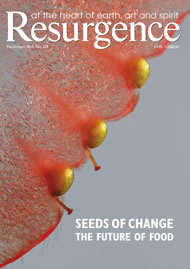Over the past three or four decades, Brian Keeble has been a leading proponent for using metaphysical principles, as found in the major spiritual traditions, to rethink our way of working and of evaluating what we produce in our work. As the founder and editor of Golgonooza Press, as cofounder of Temenos journal and the Temenos Academy, as a lecturer, essay writer and poet, and as editor of various writers exploring a similar vein, Keeble has sought to defend and practise sound “universal criteria of art”.
God and Work collects seven of Keeble’s essays on this theme, expounded for the most part by summarising the thought of several of his mentor-teachers. There are chapters dedicated to the great Traditionalist scholar Ananda Coomaraswamy, the architect W. R. Lethaby, the calligrapher Edward Johnston, the sculptor and painter Eric Gill, the metaphysician Frithjof Schuon and the poet and painter William Blake. One chapter, ‘Art and Skill’, is a more general statement of Keeble’s ideas about art – which, in his view, involves skilled making of any kind, not just the specialised aesthetic or conceptual products found in museums, galleries, small magazines and theatres. This is important. As Wendell Berry writes in the foreword, the confusion of our times has resulted in a strange split whereby “practical life” is guided by the valueless entities of business and applied science, while spiritual needs (where such are admitted) are addressed by religion. Spirit goes “Heavenward while work and the world go to Hell”.
The starting point for all these artists and writers is the traditional view of humans as creatures whose nature it is “to seek the ultimate beginning and end of things”, and who are, in the language of the Abrahamic religions, created in God’s image. From this essential principle follow certain formulations of what art and beauty are, essentially. As a result, there has to be a manner of working that is consonant with these realities.
A notion repeated many times by Keeble and Coomaraswamy, drawn from Aristotle and the Scholastics, is that art is a “habit of intellect” which resides within the artist. This is a variation on the theme, common to all the world religions, that the active life has its real basis in the contemplative life: “all art is a kind of knowledge that begins in God”; it involves cultivation and practice, “an inner habit of skill”. Because art “imitates, ultimately, a divine prototype … the artist or workman in the act of making internalizes himself,” thus returning to his own nature. In our time, however, “the handiwork of the skilled worker is undermined by the use of machines … The question of human needs hardly arises, having been displaced by the internal demands of the productive system itself.”
In keeping with this background, Keeble retraces the English radical critique of the modern industrial world – with such exponents as Cobbett, Blake, Carlyle, Ruskin and Morris – arguing for the “re-affirmation of the dignity of human labour”. Keeble’s grasp of the values involved here is incisive and clear: “Capitalist economics demands that quality yield to quantity. Time must yield to a surplus of money. What takes time in the exercise of skill must be converted to a technique that produces more and faster. This technique will begin by approximating to human skill and end by replacing skill altogether in order to produce goods that no human skill could produce. There could never be such a thing as a ‘handcrafted’ mobile telephone. What began as a way of duplicating human skill on a greater scale ends as a means to produce goods regardless of any human intervention … Gill used to say that machines are not designed to produce things but the thing called profit!” That all of this is intimately connected to the current economic and environmental crises can hardly be doubted: our commodities “show little or no sign of having been made with an eye to stimulating any sense of the nobility of [our] human calling”, and we are barraged with “techniques for producing overabundant, meaningless superfluities”.
God and Work, then, is a book that responds to a deep need that the dominant contemporary way of understanding the issues cannot address. It deserves many readers, for its uncompromising presentation of important ideas and for its sympathetic, articulate grasp of the principles of the writers and artists it discusses.








